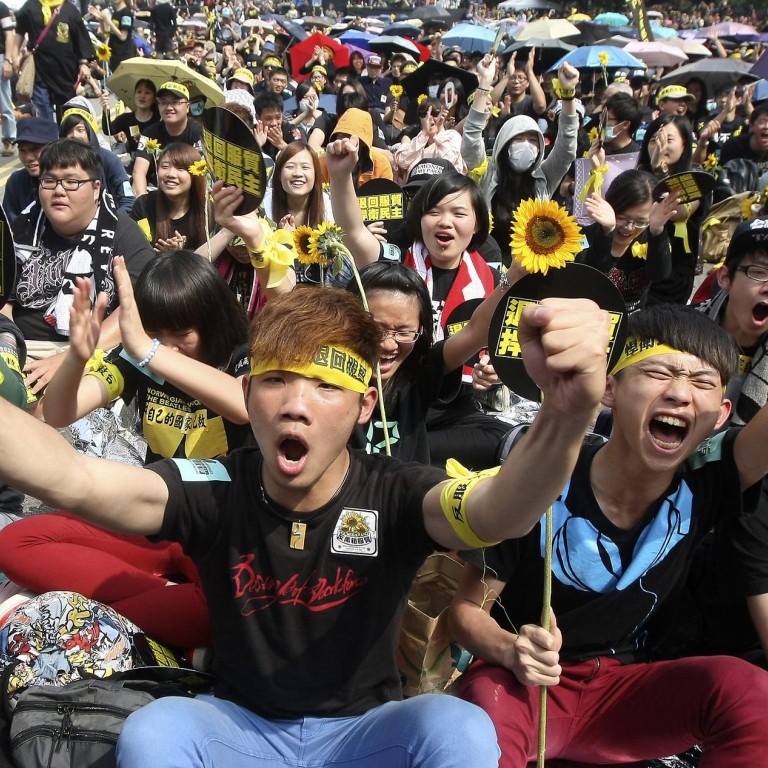
Civil disobedience movements in Taiwan and Hong Kong similar, but goals differ
Civil disobedience movements in Taiwan and Hong Kong share common characteristics, but their ultimate goals are different.
Civil disobedience movements in Taiwan and Hong Kong share common characteristics, but their ultimate goals are different, as most Hongkongers are not seeking sovereign independence, pundits and Taiwanese opposition party officials say.
Despite the divergent goals, both regions are set to nurture a new political generation through movements well versed in using various means to pressure the authorities for future reforms.
In March, Taiwan witnessed a "sunflower movement" of students resisting what they feared would be an economic invasion from the mainland and asserting the island's sovereignty.
In contrast, Hong Kong's Occupy Central was not anti-mainland, but was demanding universal suffrage, a senior official of Taiwan's main opposition Democratic Progressive Party said.
"[Occupy] is more like Taiwan's protests in the 1980s and '90s, when the Taiwanese used various means, including civil disobedience, to fight for democracy," DPP secretary general Joseph Wu said yesterday.
The "sunflower movement" was opposed to the use of a cross-strait pact to free up the services trade sector as a means to unite the island with the mainland, he said. "People in Hong Kong are fighting for universal suffrage and more democratic reforms," said Wu, who headed the Mainland Affairs Council when the DPP was in power in Taiwan.
Still, he believes the sunflower movement had an indirect influence on the campaign in Hong Kong.
In March, about 200 Taiwanese students stormed the legislature over fears that the services trade pact the island signed with the mainland last year could cause thousands of locals to lose their jobs, and that closer relations with Beijing could weaken Taiwan's self-rule.
The students occupied the parliament for nearly a month to force the government of Taiwanese President Ma Ying-jeou to review the trade pact and enact a bill increasing scrutiny of future cross-strait agreements.
Taiwan and the mainland had been bitter political rivals since a civil war ended in 1949, but ties improved sharply after Ma, of the mainland-friendly Kuomintang, was elected president in 2008 and adopted a policy to engage Beijing.
In the past six years, the two sides have signed 21 economic and non-political agreements with each other.
The occupation of the Legislative Yuan was civil disobedience on full display, but the students behaved in a civilised manner, including picking up rubbish to avoid littering the place. Their behaviour gained them support from the majority of the Taiwanese public.
The protesters also used social networking extensively to mobilise support, and aired live broadcasts through the internet so people inside and outside Taiwan could learn about what had happened and why they defied the authorities.
The protest was so successful that more than 200,000 local residents took part when the students called for a mass rally to pressure the Ma government to accede to their demands.
Pundits said all these elements were also present in the Occupy movement, although the goals of the two campaigns differed.
"Movements like these are infectious," Hsu Yung-ming, a political science professor at Soochow University in Taipei, said.
Hsu, seen as a pro-DPP scholar, cited the 1989 Tiananmen Square crackdown on pro-democracy mainland students. That inspired a "Wild Lily" student movement in Taiwan the following year that demanded direct elections of the parliament and of the president, he said.
Occupy was not aiming to overthrow the Hong Kong or central governments, he said, but was a show of Hongkongers' anger at Beijing's breach of trust through the imposition of a restrictive framework for electoral reform.
"What is worth noting is that a social movement like this, regardless of where it happens, would always bring forth a new political generation who will follow the footsteps of their predecessors in demanding further reforms," Hsu said.
The professor did not think Occupy, taking place as it is in a city where most people favour stability and economic growth, would fizzle out in time. "A social movement, once it starts, cannot be controlled easily," he said. "The reaction of the authorities is very important because, if they overreact, such as by using tear gas to disperse the crowd, the crackdown is bound to backfire."

